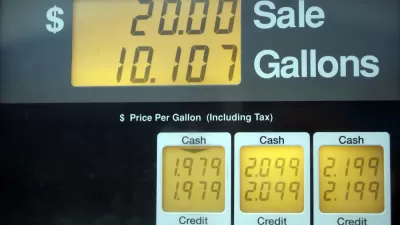An economist from the Tax Foundation spoke to advocates of a mileage-based user fees. First surprise, he calls it a tax, not a fee. He appears to favor the MBUF over the gas tax, but notes its problems.
In late February, the Mileage-Based User Fee Alliance held their second annual conference. Guest speaker: Kyle Pomerleau, an economist for the Tax Foundation’s Center for Federal Tax Policy.
"I was invited to speak on the tax policy and the taxpayer perspective of mileage-based taxes, or sometimes referred to as vehicle miles traveled (VMT) taxes," writes Pomerleau. "This group is interested in how mileage-based taxes could help better fund transportation spending and how it can better 'price' roads than the gas tax."
The basis for the gas tax is the user-pays principle of taxation. This principle states that those who benefit from government spending (in this case roads) should pay for the associated government spending. This “prices” the roads in order to prevent overconsumption (congestion) and makes sure there is sufficient revenue to fund repairs.
Gas tax "underprices" roads
Pomerleau points out the inherent flaw in gas taxes: it's a tax on fuel consumption, not on driving. Furthermore, it isn't adjusted for inflation. Result: it "underprices roads, which leads to an underfunded trust fund and crowded roads."
Inherent problems with VMT Fee (or Tax)
While a mileage based system could raise sustainable revenue and price roads more effectively than the gas tax, there are some possible drawbacks. It requires more administration than the gas tax, people have privacy concerns about their vehicle being tracked, and since it is much more salient compared to the gas tax, there may be more political opposition.
Even if the VMT Fee were a consideration on the federal level (as it is in Oregon and many other states), it's not ready to be implemented any time soon, while the Highway Trust Fund runs out of funding on May 31, notes Pomerleau, who closes his essay by writing, "A more near-term solution needs to be devised that fixes the trust fund, whether it is spending reform, funding reform, or some combination of the two."
In a second, comprehensive piece on the federal gas tax and the Highway Trust Fund, Pomerleau describes the Obama plan that would repatriation tax revenue. "This type of proposal violates a number principles of good government finance, among them, the user-pays principle which states that taxpayers should pay for the government services they use." He goes on to analyze various "Options to Fix the Highway Trust Fund."
FULL STORY: Replacing the Gas Tax with a Mileage-Based Tax

Maui's Vacation Rental Debate Turns Ugly
Verbal attacks, misinformation campaigns and fistfights plague a high-stakes debate to convert thousands of vacation rentals into long-term housing.

Planetizen Federal Action Tracker
A weekly monitor of how Trump’s orders and actions are impacting planners and planning in America.

Chicago’s Ghost Rails
Just beneath the surface of the modern city lie the remnants of its expansive early 20th-century streetcar system.

Bend, Oregon Zoning Reforms Prioritize Small-Scale Housing
The city altered its zoning code to allow multi-family housing and eliminated parking mandates citywide.

Amtrak Cutting Jobs, Funding to High-Speed Rail
The agency plans to cut 10 percent of its workforce and has confirmed it will not fund new high-speed rail projects.

LA Denies Basic Services to Unhoused Residents
The city has repeatedly failed to respond to requests for trash pickup at encampment sites, and eliminated a program that provided mobile showers and toilets.
Urban Design for Planners 1: Software Tools
This six-course series explores essential urban design concepts using open source software and equips planners with the tools they need to participate fully in the urban design process.
Planning for Universal Design
Learn the tools for implementing Universal Design in planning regulations.
planning NEXT
Appalachian Highlands Housing Partners
Mpact (founded as Rail~Volution)
City of Camden Redevelopment Agency
City of Astoria
City of Portland
City of Laramie



























